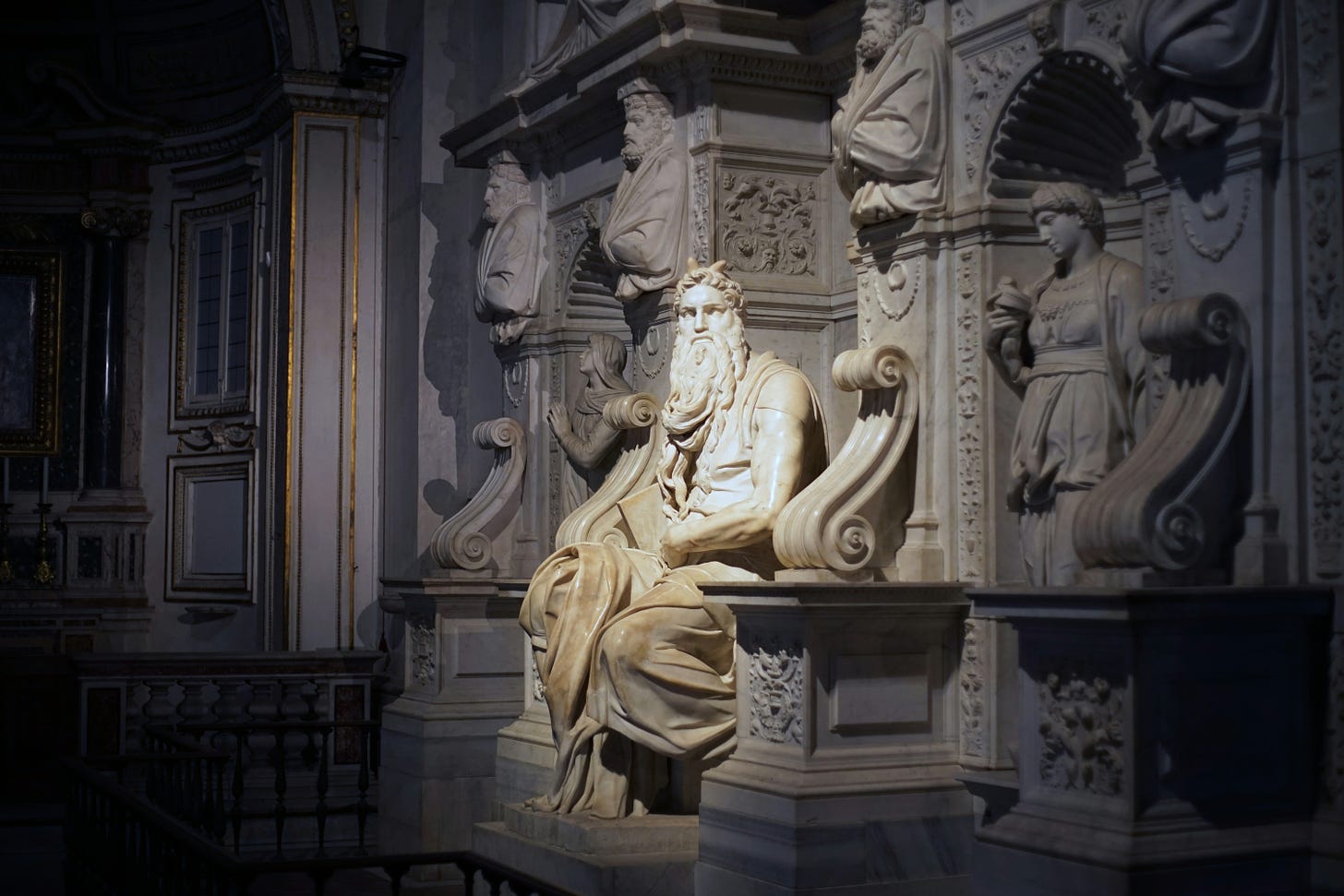Redux: Mister Rogers, Moses and Me
Revisiting reflections on shame, self doubt and experiencing authentic acceptance from God
Joan Meets Fred
When we introduced our daughter to Mister Rogers’ Neighborhood. she became enamored with the cardigan clad man and his Land of Make-Believe. (We used to ask her to “make a snappy new day” and she’d put her thumb and index finger together to try and snap…it was adorable!) Even though my wife Jillian and I both watched the show as kids, we have been amazed in re-watching it, how he handled such complicated and often culturally sensitive topics from racism to divorce.
I’ll admit it has turned me into a bit of a Fred Rogers fanboy as I’ve read up on some of what made this guy tick. One night while watching videos of him on Youtube though, something else caught my attention.
During an interview he did with Joan Rivers, she asked him to sing the song, “It’s You I Like.” A classic Mister Rogers tune. Here are the lyrics:
It's you I like, It's not the things you wear, It's not the way you do your hair But it's you I like The way you are right now, The way down deep inside you Not the things that hide you, Not your toys They're just beside you But it's you I like Every part of you Your skin, your eyes, your feelings Whether old or new I hope that you'll remember Even when you're feeling blue That it's you I like It's you yourself It's you It's you I like
When Rogers sang this song to Joan Rivers however, he substituted the line about “toys” for, "Not your jokes, They’re just beside you.”
As he continued to sing, I watched as Ms. Rivers pulled her sweater over her to hide her face from Mister Rogers’ overwhelming kindness. It was obvious she was incredibly uncomfortable with this man singing to her, who didn’t want anything, had no ulterior motive and no agenda. He just wanted to communicate that she didn’t need to hide behind anything in order to be who she was meant to be, not even the thing that made her wildly successful.
Another video of her interviewing him at a different time seems to show something similar. The very presence of Mister Rogers seemed to cause Joan Rivers to feel utterly inadequate and shameful on some level.
As I watched, I couldn’t help but think of two other people who have reacted similarly: Moses and Me.
Moses Meets God
Moses had run from Egypt.
He’d tried to find a new start among a new people but never quite felt like he belonged. The name he gave his son in Exodus 2:22 Gershom, meaning “I am an alien in a foreign land”, gives us some insight into the lack of belonging he probably felt in his life.
To top it all off, being raised in pharoah’s household by a woman who wasn’t his biological mother probably didn’t help with feeling like he didn’t belong even though he knew he was a Hebrew, (2:11), not an Egyptian, even though he obviously looked like one (2:19). I can only imagine the crisis of identity Moses must have been experiencing throughout the first 40+ years of his life.
Then one day while tending to the flock of his father-in-law, something happened that changed his world forever. He had an encounter with God. Moses turned aside to see why the bush was on fire but wasn’t burning up, and then heard a voice calling his name: “Moses! Moses!” (Interesting to note, by the way, his very name “Moses” means “I drew him out of the water.” The name given to him by the Egyptian princess would remind him not of his lineage and where he comes from, but further enforce a placeless identity.)

Moses answers God, “Here I am…” God’s response is amazing. He says not come to any closer “Take off your sandals, for the place where you are standing is holy ground.” God establishes that this place is unlike any other Moses has ever been in. Yes, sure he’s been in Pharaoh’s palace, but he’s never been on holy ground before.
The placeless prophet is suddenly in a location that has the potential to be more like home than any other he’s ever known. A place that can reveal to him his true self and remind of his true identity. God continues by doing just that: “I am the God of your father, the God of Abraham, the God of Isaac and the God of Jacob.” God gives Moses the very words he needed to hear to communicate to him his worth, identity and sense of belonging. He comes to him as God, not just of Abraham, Isaac, and Jacob who would have been distant great-grandfathers, but as the God of his own father.
Moses wasn’t forgotten. Moses wasn’t from an unknown place. He belonged. He belonged to a family and this was the God that knit that family together ready to meet with Moses face to face, just as he was.
The intense focus on Moses’ true self was just too much however and he pulled a “Joan Rivers”: “At this, Moses hid his face, because he was afraid to look at God” (Exodus 3:6).
This is too important to miss. God never tells him to hide his face, he tells him to remove his sandals, a sign of reverence and humility. Instead, of removing his sandals (there is no reference to that happening) Moses hides his face in fear. His shame leads him to an extreme act that God never asks of him.
Humility is important, but we often do humiliating things out of shame (self-focus) instead of humility (God focus). We are so afraid of people disliking us, the real us, that we hide, we cover the real us. Joan Rivers hid behind her jokes, Moses hid behind his cloak. Neither of them could deal with the sense of being exposed by the presence of one who had nothing but love for them.
Face to Face With Love
Shame is a brutal monster. I’m learning this for myself. I hide just like Moses and Joan. The presence of one who is all-loving towards me and doesn’t like me for what I do or what I have but for who I am is actually terrifying.
I have a similar story of “placelessness” to Moses. I moved often growing up, finding it hard to establish a sense of belonging. I was always hungry to find someone or something to cling to in order to establish a sense of value and worth whether it be in sports, friends, academics, or ministry.
I sought to succeed at something in order to find acceptance and ultimately belonging. In some ways, this hasn’t changed as a pastor. I find myself struggling at times to simply be myself and not who I think others would like to be around. I especially find this true with friends of mine who are also pastors and working in churches.
It is so easy to try and hide behind achievements or stories of things God has done instead of learning to be comfortable with who I am; Who God has actually made me to be. I’ve needed, and still need, to do something I don’t know that Joan Rivers ever did: Look love straight in the face and accept that my true self is loved, and even, liked.
Moses learned to do this. As my friend, Dr. Rob Reimer says, Moses went from hiding his face, to being “Face to face” and then “mouth to mouth” friends with God. What he means by this is that Moses learned to deal with his shame.
He learned that the only way he was going to be able to get victory over his sense of homelessness was by learning to be at home in the presence of the one who loved him dearly.
Moses had to learn to receive face to face as God sang over him, “It’s you I like”, Moses had to learn to receive face to face as God sang over him, “It’s not the staff you carry or the things you do or the people you lead, they’re just beside you.”
It is much easier to hide my face from God when I feel shame. When I feel that sense of “placelessness” or worthlessness. But the only place I can find real belonging is on this holy ground. Not with face covered, but with feet uncovered - connecting me to the place of belonging, that feels like home - right in the presence of the One who loves me just as He created me to be.
If this was helpful to you or brought other thoughts to mind, I’d love to hear about them in the comments.






A great writeup, very thought-provoking about a unique situation in which we feel shame. It's also not easy to take truly honest look at yourself and realize how much man's opinions (or even our assumptions of other's opinions!) shape our behavior and how we present ourselves.
On the scripture-side, my over active brain goes two ways:
What do you think about Adam's experience of shame in Genesis 3? Maybe it doesn't fit your situation as well, but would your writeup have a different conclusion if that was the example instead of Moses?
-and-
What do you think about Moses's later experience of God in Exodus 33? ("I will put you in the cleft of the rock... you shall see my back, but my Face will not be seen.")